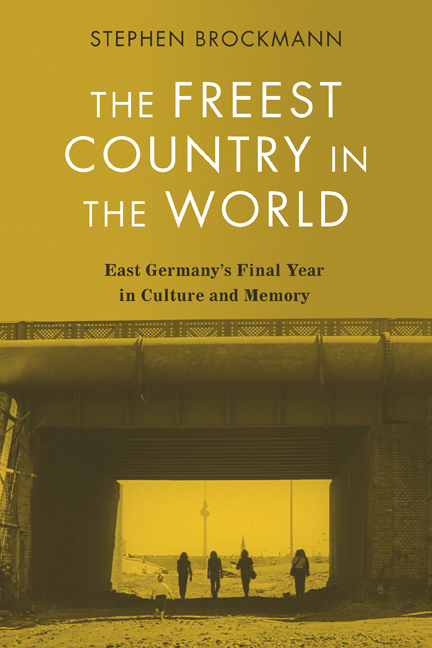Book contents
- Frontmatter
- Dedication
- Contents
- Acknowledgments
- Introduction: The Memory of Freedom
- 1 Protocols of History: Reunification Documentaries from 1989/1990
- 2 Anarchy in the GDR
- 3 The National Liberation Zone
- 4 Coming of Age as the State Dies: Three Novels and Their Heroes
- 5 Provincial Theater: Fiction Film Struggles to Address German Reunification in the Early 1990s
- 6 The Grand Theater of the East and the Imaginary Stasi: The Emergence of the Standard Depiction of German Reunification in Film and on Television
- 7 Ritual, Repetition, and Memory: Commemorating and Memorializing 1989/1990
- Conclusion: The Last GDR
- Selected Works Cited
- Filmography
- Index
2 - Anarchy in the GDR
Published online by Cambridge University Press: 11 January 2024
- Frontmatter
- Dedication
- Contents
- Acknowledgments
- Introduction: The Memory of Freedom
- 1 Protocols of History: Reunification Documentaries from 1989/1990
- 2 Anarchy in the GDR
- 3 The National Liberation Zone
- 4 Coming of Age as the State Dies: Three Novels and Their Heroes
- 5 Provincial Theater: Fiction Film Struggles to Address German Reunification in the Early 1990s
- 6 The Grand Theater of the East and the Imaginary Stasi: The Emergence of the Standard Depiction of German Reunification in Film and on Television
- 7 Ritual, Repetition, and Memory: Commemorating and Memorializing 1989/1990
- Conclusion: The Last GDR
- Selected Works Cited
- Filmography
- Index
Summary
I wanna be anarchy
And I wanna be anarchy
Know what I mean?
And I want to be an anarchist
I get pissed, destroy
—The Sex Pistols, “Anarchy in the UK” (1977)The East German punk scene was active and creative throughout the 1980s. It shaped the counterculture of the decade, right up through and beyond the collapse of the state and the reunification of Germany in 1989–1990. Punk developed in the GDR in the late 1970s, a few years after its emergence in Great Britain and the United States. East German punk also imitated the styles and tastes of punk in the West. In the different context of state socialism, however, punk inevitably acquired a different meaning. It became, as chronicler Tim Mohr has argued, “something uniquely […], even stridently Eastern.”
By 1989, when the East German revolution transformed the country, punk was the most visible, in-your-face countercultural style among East German youth. It did not by any means represent a majority of the youthful population, but it constituted a powerful and culturally influential minority whose impact went well beyond its immediate practitioners. Punk provided the nonconformist backdrop to the large-scale political, social, and economic transformations in East Germany. In many ways, as Peter Ulrich Weiß has argued, punk “dominated the subcultural wing of the GDR opposition movement until the demise of the GDR.”
Of course there were other countercultural scenes and movements in the GDR, including the peace movement, environmental groups, churchbased nonconformists, gay and women's rights advocates, samizdat publications, and independent art galleries, but, because of its open rejection of social and political norms, as well as its highly visible presence on the streets of cities, towns, and even villages, the punk scene was particularly prominent. The East German secret police complained about punk's “outward appearance, which is intended to make a public impact.” Punk also entered into productive alliances with other countercultural phenomena, including samizdat publications, independent galleries, and underground moviemaking, as well as with high culture and the Protestant church. However, punk was usually treated more harshly by the state than these other groupings.
- Type
- Chapter
- Information
- The Freest Country in the WorldEast Germany's Final Year in Culture and Memory, pp. 76 - 116Publisher: Boydell & BrewerPrint publication year: 2023



